Compassionate and Urgent Leave Policy
Effective Date: [Insert Date]
Review Date: [Insert Date]
Policy Owner: Human Resources Department
1. Purpose and Scope
This policy outlines the provisions for compassionate and urgent leave available to all employees of [Company Name]. We recognize that unexpected and distressing circumstances may arise in employees' personal lives that require immediate attention and time away from work. This policy aims to provide support during such difficult times while maintaining operational requirements.
This policy applies to all permanent, fixed-term, and probationary employees.
2. Policy Statement
[Company Name] is committed to supporting employees through difficult personal circumstances. We acknowledge that there are times when employees need to be away from work due to urgent family matters, bereavement, or other compassionate reasons. This policy ensures employees can take necessary time off while receiving appropriate support from the organization.
3. Definitions
3.1 Compassionate Leave
Time off granted to employees to deal with the death or critical illness of an immediate family member or close relative, or to attend their funeral.
3.2 Urgent Leave
Time off granted for unexpected emergencies or urgent situations that require the employee's immediate attention and cannot reasonably be scheduled outside of working hours.
3.3 Immediate Family
For the purposes of this policy, immediate family includes:
- Spouse or domestic partner
- Children (including biological, adopted, step, and foster children)
- Parents (including biological, adopted, step, and foster parents)
- Siblings
- Grandparents and grandchildren
- Parents-in-law
4. Entitlement
4.1 Compassionate Leave Entitlement
| Circumstance | Leave Entitlement | Paid/Unpaid |
|---|---|---|
| Death of immediate family member | Up to 5 working days | Paid |
| Death of extended family or close friend | Up to 2 working days | Paid |
| Critical illness of immediate family member | Up to 3 working days | Paid |
| Additional leave if required | As approved by management | Unpaid or annual leave |
4.2 Urgent Leave Entitlement
Employees are entitled to up to 3 days of paid urgent leave per calendar year for genuine emergencies, including but not limited to:
- Unexpected childcare breakdown
- Emergency home repairs (flooding, fire, break-in)
- Urgent medical appointments that cannot be scheduled outside work hours
- Dependency care emergencies
- Court appearances (non-work related)
- Other genuine unforeseen circumstances requiring immediate attention
Note: Urgent leave is not intended for routine appointments or matters that can be scheduled outside of working hours.
5. Application Process
5.1 Notification Requirements
Employees should notify their immediate supervisor or manager as soon as possible when compassionate or urgent leave is required. While advance notice may not always be possible, employees should communicate:
- The reason for the leave request
- The expected duration of absence
- Any urgent work matters requiring immediate attention
- Contact information (if appropriate and available)
5.2 Formal Request
Within a reasonable timeframe following the leave (typically within 5 working days of return), employees must submit a formal leave application through [company system/HR department] including:
- Completed leave application form
- Brief explanation of circumstances
- Supporting documentation where applicable (e.g., death certificate, funeral notice, medical certificate)
5.3 Documentation
The company may request appropriate documentation to support the leave request. We recognize the sensitive nature of these situations and will handle all information with discretion and confidentiality. Documentation requirements will be reasonable and proportionate to the circumstances.
6. Manager Responsibilities
Managers and supervisors are responsible for:
- Responding to leave requests with empathy and understanding
- Approving compassionate and urgent leave requests in accordance with this policy
- Maintaining confidentiality regarding the circumstances of leave
- Making reasonable work arrangements to accommodate the employee's absence
- Following up with the employee upon their return to offer support
- Escalating exceptional circumstances to HR for consideration
7. Additional Support
[Company Name] recognizes that returning to work after a difficult personal circumstance can be challenging. The following support measures are available:
- Flexible working arrangements (where operationally feasible)
- Phased return to work
- Access to Employee Assistance Program (EAP) for counseling services
- Temporary adjustment of duties or workload
- Additional unpaid leave if required
8. Exceptional Circumstances
We understand that every situation is unique. In exceptional circumstances requiring leave beyond the standard entitlements outlined in this policy, employees should discuss their situation with their manager and Human Resources. Each case will be considered on its individual merits, taking into account:
- The nature and severity of the circumstances
- The employee's relationship to the person affected
- The employee's service record and leave history
- Operational requirements
9. Confidentiality
All information relating to compassionate and urgent leave requests will be treated with the strictest confidence. Information will only be shared on a need-to-know basis and with the employee's consent, except where required by law.
10. Interaction with Other Leave
Compassionate and urgent leave is separate from and in addition to annual leave entitlements. However, employees may choose to use annual leave in conjunction with or following compassionate/urgent leave if additional time off is required.
This leave does not affect sick leave entitlements and should not be recorded as sick leave.
11. International/Remote Employees
For employees working internationally or remotely, compassionate and urgent leave provisions apply in accordance with this policy, taking into consideration any applicable local laws and reasonable travel time requirements.
12. Abuse of Policy
While we trust our employees to use this leave appropriately, any suspected abuse of this policy will be investigated and may result in disciplinary action in accordance with the company's disciplinary procedures.
13. Policy Review
This policy will be reviewed annually or as required to ensure it remains current and meets the needs of employees and the organization.
14. Questions and Contact Information
For questions about this policy or to discuss specific circumstances, please contact:
Human Resources Department
Email: [HR email address]
Phone: [HR phone number]
Office: [Location]
Policy Approval:
Signature
[Name]
[Title]
Date: _______________
Signature
[Name]
[Title]
Date: _______________
Compassionate and Urgent Leave Policy
1. PURPOSE
1.1. To standardize the processing of Compassionate and Urgent Leave requests. Compassionate leave is defined as the leave which may be provided to an employee due to the bereavement or passing away of a direct family member.
1.2. Urgent leave may be provided to an Employee due to the extremely serious or grave nature of the illness of a direct family member.
1.3. To notify Employees regarding the policy.
2. POLICY
2.1. Compassionate leave is informed (verbally and subsequently online) to the direct line manager or designee for immediate action.
2.2. An Online Leave application must be submitted as soon as possible for approval by the direct supervisor / manager / COO / CEO.
2.3. Reason for leave must be clearly documented on the leave application. All line managers are urged to pay attention to the reason for leave requests and the time off requested. Justification must be asked for and evidenced.
2.4. All employees are entitled to 5 days paid compassionate leave with evidence. Any days in excess of 5 days of the compassionate leave would be commuted to annual or unpaid leave depending on the leave balances.
2.5. Compassionate leave is applicable to the immediate family only (Father, Mother, Brother, Sister, Spouse, Children or proven dependents).
2.6. All compassionate leave must be approved by the direct manager or a senior management person. The intention is to expedite the travel of the employee and to support them as much as possible in this process. All system requirements may be dealt with after the fact.
2.7. Discretionary approval can be given on a case to case basis to significant others of the employee other than those mentioned in 2.5 by Dir-HR / COO / CEO respectively.
2.8. Urgent leave is defined as leave required in an emergency. If the Department manager can cover the services as required, they can approve this leave in the normal leave application process. The Department manager may approve up to 10 days for urgent leave. This leave is deducted from the employee’s unpaid leave or paid leave as per the leave balance.
2.9. If urgent leave has been requested due to the grave nature of illness that results in the death of the immediate family member, the annual leave can be converted to compassionate leave with the production of evidence of death (such as death certificate, newspaper notice of death, or an email from the hospital’s senior official).
3. PROCEDURE
3.1. In the case of compassionate leave immediate verbal approval can be taken from the immediate manager. The manager can then fill in the online form on behalf of the employee. If the immediate manager is not available another senior management person can do this task even if the employee has already left.
3.2. Employees are required to fill out an online leave application form in the System for Emergency or Urgent leave.
3.3. The form shall be directed to the employee's immediate manager for approval and immediate action. The manager can verbally inform the employee of his decision.
3.4. The employee shall receive a system generated notification once the leave is approved by all the authorized approvers.
3.5. Employee’s leave records shall be automatically updated in the system for future reference.
3.6. On return from Compassionate or Urgent leave if there has been any change in circumstances, the Employee should submit a revised form as per the System requirements.
4. REFERENCES
4.1. Labor Law.
5. ATTACHMENTS
None
What is Compassionate and Urgent Leave and Why Do You Need This Letter?
Compassionate and urgent leave is time off granted to employees facing serious personal or family emergencies that require immediate attention. This includes situations like the death of a loved one, critical illness, family crises, or other unforeseen circumstances that demand your presence. The letter serves as formal documentation of your request, providing your employer with necessary context while maintaining professionalism during difficult times. It helps establish a clear record of your absence, ensures proper workflow management, and protects both your job security and your right to attend to urgent personal matters.
Who Should Send This Letter?
- Employees at any level experiencing a genuine emergency or compassionate situation
- Full-time, part-time, or contract workers needing urgent time off
- Staff members who have exhausted standard leave options or need immediate departure
- Workers in organizations with formal leave policies requiring written requests
- Anyone needing documented proof of their absence for HR records or insurance purposes
- Employees who may need to extend initially requested leave periods
To Whom Should This Letter Be Addressed?
- Direct supervisor or line manager (most common recipient)
- Human Resources department for formal processing
- Department head in larger organizations
- General manager or business owner in smaller companies
- Leave coordinator or workforce planning team
- Multiple recipients simultaneously (supervisor CC'd with HR) for urgent situations
- Payroll department when unpaid leave is involved
Immediate Family Emergency Leave Request (Professional)
Subject: Urgent Leave Request - Family Emergency
Dear [Manager's Name],
I am writing to request immediate compassionate leave due to a family emergency. My [relationship - father/mother/sibling] has been hospitalized with a critical condition, and I need to be with my family during this difficult time.
I am requesting leave starting [date] and anticipate needing approximately [number] days, though I may need to extend this depending on the situation. I will keep you informed of any developments and provide updates on my expected return date.
I have briefed [colleague's name] on my current projects, and they have agreed to handle urgent matters in my absence. I will remain accessible via email for critical issues that only I can address.
I understand this creates challenges for the team, and I sincerely appreciate your understanding during this difficult period. I will submit any required documentation upon my return.
Thank you for your consideration.
Sincerely,
[Your Name]
[Your Position]
[Date]
Bereavement Leave Request (Formal)
Subject: Bereavement Leave Request
Dear [Manager's Name],
It is with deep sadness that I inform you of the passing of my [relationship - grandmother/uncle/spouse]. I am writing to formally request bereavement leave to attend the funeral services and support my family during this time of mourning.
I request leave from [start date] through [end date], which will allow me to travel to [location if relevant], attend the services, and manage necessary arrangements. The funeral is scheduled for [date] in [city/state].
I have prepared handover notes for my current responsibilities and have coordinated with [colleague names] to ensure continuity. All urgent tasks have been completed or delegated appropriately.
Please let me know if you require any documentation, such as a death certificate or funeral notice. I will provide these upon my return to work.
Thank you for your compassion and support during this difficult time.
Respectfully,
[Your Name]
[Department]
[Contact Information]
Medical Emergency Leave for Dependent (Heartfelt)
Subject: Compassionate Leave Request - Child's Medical Emergency
Dear [Manager's Name],
I hope this message finds you well. I am reaching out during an incredibly challenging time for my family. My [son/daughter], [child's name], age [age], has been diagnosed with [condition] and requires immediate medical intervention and ongoing treatment.
As their primary caregiver, I need to request compassionate leave starting immediately to be present for [his/her] surgery scheduled for [date] and to provide care during recovery. I am requesting [number] weeks initially, with the possibility of extension based on medical advice.
This situation has come as a shock to our family, and I am grateful to work for an organization that values family and understands that sometimes life demands our full attention elsewhere. I have complete faith in my team to manage my responsibilities, and I will do everything possible to ensure a smooth transition before I leave.
I am happy to provide medical documentation from [child's] healthcare provider to support this request. I will stay in touch regarding my return timeline and will update you as I learn more about the treatment plan.
Thank you for your understanding and support during this frightening time.
With gratitude,
[Your Name]
Mental Health Crisis Leave (Simple)
Subject: Urgent Leave Request - Personal Health Matter
Dear [Manager's Name],
I am writing to request immediate leave for a serious personal health matter that requires my full attention. I need to take leave starting [date] and expect to return by [date].
My doctor has advised that I need this time to focus on my health and recovery. I will provide a medical certificate as documentation.
I have informed [colleague] about pending tasks and will check emails periodically if needed.
Thank you for your understanding.
Best regards,
[Your Name]
Extended Family Crisis Leave (Detailed)
Subject: Request for Compassionate Leave - Family Crisis
Dear [Manager's Name] and HR Team,
I am writing to request compassionate leave due to an urgent family crisis that requires my immediate presence and involvement. My elderly parents, who live in [location], are facing a serious situation that necessitates my support and coordination of care.
Specifically, my [father/mother] has suffered a severe stroke and requires immediate placement in specialized care, while my other parent is unable to manage alone. As the primary family member able to assist, I need to travel to [location] to arrange medical care, coordinate with healthcare providers, manage legal and financial matters, and ensure their safety and wellbeing.
I am requesting leave from [start date] for an initial period of [number] weeks. Given the complexity of the situation, I may need to request an extension, and I commit to providing regular updates on my expected return date.
To minimize disruption, I have taken the following steps:
- Completed all deliverables due during my absence
- Created detailed handover documentation for ongoing projects
- Briefed [colleague names] on critical responsibilities
- Set up email auto-responder with alternative contacts
- Arranged for [colleague] to attend scheduled meetings on my behalf
I understand this creates challenges for the team and appreciate your flexibility. I am willing to discuss options such as unpaid leave if my absence extends beyond available paid leave entitlements.
I will provide any required documentation and remain available via phone for genuinely urgent matters, though my response time may be delayed.
Thank you for your understanding and support during this extremely difficult time.
Sincerely,
[Your Name]
[Position]
[Department]
[Contact Number]
Natural Disaster/Home Emergency Leave (Urgent)
Subject: URGENT - Emergency Leave Required - Home Disaster
Dear [Manager's Name],
I need to request immediate emergency leave due to [flood/fire/storm damage] at my home that occurred [last night/this morning]. My family and I must address critical safety issues and secure temporary housing.
I need to leave immediately and request leave for [number] days starting today. I will update you within 48 hours regarding my return date once I assess the full extent of the situation.
I apologize for the short notice. I will check emails when possible and have notified [colleague] about urgent matters.
Thank you for your understanding.
[Your Name]
[Phone Number]
Unexpected Childcare Emergency (Provisional)
Subject: Emergency Leave Request - Childcare Crisis
Dear [Manager's Name],
I am writing to request emergency leave due to an unexpected childcare situation. My regular childcare provider [has fallen ill/is unavailable/emergency closure] and I have no backup arrangements available at this time.
I am requesting leave for [today/tomorrow] and possibly [additional days] while I arrange alternative care. I am actively working to resolve this as quickly as possible and will keep you updated on my situation.
I can be reached by phone for any urgent matters and will work remotely if any critical issues arise that only I can handle.
I appreciate your understanding and will confirm my return date as soon as childcare is secured.
Thank you,
[Your Name]
Domestic Violence/Safety Emergency Leave (Serious)
Subject: Confidential - Urgent Leave Request
Dear [Manager's Name/HR Manager],
I am writing to request immediate compassionate leave due to a serious personal safety matter that requires my urgent attention. For confidentiality reasons, I am unable to provide specific details at this time.
I need to request leave starting immediately for approximately [number] days/weeks. I will provide updates on my return date as circumstances allow.
I have made arrangements for [colleague] to handle my immediate responsibilities and will be available by email for critical issues only.
I would greatly appreciate your discretion regarding this matter. I am happy to provide any necessary documentation in confidence to HR.
Thank you for your understanding and support.
[Your Name]
[Contact Information]
Requirements and Prerequisites Before Sending This Letter
- Review your employment contract and company policy on compassionate/emergency leave entitlements
- Check your remaining leave balance (annual, sick, personal) in the HR system
- Verify required notice periods, though emergencies typically override these requirements
- Gather any initial documentation you have available (medical certificates, death certificates, police reports)
- Identify colleagues who can cover your responsibilities and brief them when possible
- Prepare a list of ongoing projects and their current status
- Secure contact information for your manager and HR if sending from outside the office
- Know whether your leave will be paid or unpaid based on company policy
- Understand any documentation deadlines for your organization
- Consider whether you need to request accommodation under FMLA or similar laws
When Should You Send This Letter?
- Immediately upon learning of a death in the family
- As soon as you're notified of a family member's critical illness or hospitalization
- When a dependent has a medical emergency requiring your care
- After natural disasters or emergencies affecting your home or family safety
- When experiencing a mental health crisis requiring immediate intervention
- Upon unexpected childcare emergencies with no alternative solutions
- When personal safety situations require immediate action
- After accidents involving family members
- When elderly parents require urgent care coordination
- During pregnancy complications or miscarriage
- When legal emergencies require immediate attention (court appearances, custody issues)
- After traumatic events affecting you or immediate family members
How to Write and Send This Letter
- Assess urgency: Determine if you need to leave immediately or can provide advance notice
- Choose communication method: Email for documentation, phone call first for extreme urgencies
- Be direct and clear: State your need upfront without excessive detail
- Provide essential information: What happened, how much leave you need, when you'll return
- Maintain professionalism: Even in crisis, keep communication respectful and clear
- Offer solutions: Mention coverage arrangements or handover plans when possible
- Keep it appropriate: Share only necessary details; protect your privacy
- Request rather than demand: Use respectful language while being firm about your needs
- Indicate availability: Let them know if/how you can be contacted
- Proofread quickly: Check for clarity even if perfect grammar isn't possible
- Send to appropriate people: Manager first, then HR, or both simultaneously for emergencies
- Follow up: Confirm receipt if the matter is time-sensitive
Formatting Guidelines and Best Practices
- Length: Keep it concise (200-400 words); emergencies don't require lengthy explanations
- Tone: Match the seriousness of your situation; professional yet human
- Subject line: Make it clear this is urgent if immediate action is needed
- Timing: Send during business hours when possible; call if after hours
- Format: Email for record-keeping; phone call for immediate departures
- Details: Provide enough context without oversharing personal information
- Dates: Be specific about start dates; estimates are acceptable for return dates
- Contact info: Include phone number for urgent situations
- Attachments: Mention you'll provide documentation later rather than delaying to gather it
- Style: Use standard business letter format even in crisis
- Privacy: Mark as confidential if the situation is sensitive
- Copies: CC HR for immediate documentation when appropriate
What to Do After Sending the Leave Request
- Confirm receipt within 2-4 hours if you haven't heard back, especially for immediate leave
- Provide regular updates on your situation and expected return date every 3-5 days
- Submit medical certificates or other documentation within required timeframes (usually 2-7 days)
- Maintain minimal contact with workplace unless specifically needed
- Notify your manager 2-3 days before your planned return to confirm the date
- Prepare a brief update on your readiness to return to work
- Schedule a return-to-work meeting if your absence was extended
- Submit any expense claims related to your emergency if applicable
- Update your calendar and notify relevant colleagues of your return
- Thank your team and manager for their support and understanding
- Request any workplace accommodations you may need upon return
- Complete any required paperwork or return-to-work assessments
Common Mistakes to Avoid
- Providing too much personal or medical detail that compromises your privacy
- Failing to notify anyone before simply not showing up to work
- Being vague about the nature of the emergency when some context is needed
- Forgetting to mention coverage arrangements, leaving team stranded
- Not following up with documentation within required timeframes
- Requesting insufficient time and needing to extend repeatedly
- Using compassionate leave for non-emergency situations
- Failing to keep your employer updated on changing circumstances
- Not reading your company's leave policy before making assumptions
- Sending the request to the wrong person or department
- Apologizing excessively when you have nothing to apologize for
- Promising to work during your leave when you should be focusing on the emergency
- Not keeping copies of your leave request and related correspondence
- Failing to clarify whether the leave is paid or unpaid
- Returning to work before you're genuinely ready
Essential Elements and Structure of the Letter
- Clear subject line indicating urgency and leave type
- Proper greeting addressing the appropriate person
- Direct statement of the leave request in the opening sentence
- Brief explanation of the situation (2-3 sentences maximum)
- Specific dates including start date and estimated return
- Coverage plans or mention of handover arrangements
- Contact information and availability during leave
- Documentation commitment promising to provide proof when available
- Professional closing with thanks for understanding
- Your full name, position, and contact details
- Attachments (if available): medical certificates, death notices, police reports
- CC line including HR or other relevant parties
Advantages and Disadvantages of Sending This Letter
Advantages:
- Creates official documentation protecting your employment rights
- Demonstrates professionalism even during personal crisis
- Provides clear record for HR and payroll processing
- Shows respect for workplace policies and procedures
- Enables proper workflow management and coverage arrangements
- Protects you from disciplinary action for unauthorized absence
- May be required for insurance or legal purposes
- Helps maintain positive relationships with employer
Disadvantages:
- May feel impersonal during emotional situations
- Could delay immediate departure if you wait for approval
- Might reveal private information you'd prefer to keep confidential
- Creates paper trail that remains in your personnel file
- May impact performance reviews if absences are frequent
- Could affect advancement opportunities in competitive environments
- Might strain relationships if timing is particularly inconvenient
Comparing Compassionate Leave Requests with Other Leave Types
Vs. Annual Leave: Compassionate leave is for emergencies and typically approved with less notice, while annual leave requires advance planning and approval.
Vs. Sick Leave: Sick leave is for your own illness; compassionate leave is for family emergencies or bereavements requiring your presence elsewhere.
Vs. Unpaid Leave: Compassionate leave may be paid depending on policy, whereas unpaid leave is typically for extended absences that exceed paid entitlements.
Vs. FMLA (US): FMLA provides job protection for extended family medical situations but requires specific eligibility; compassionate leave is typically shorter and more flexible.
Vs. Informal Arrangements: A formal letter provides legal protection and documentation that verbal requests cannot offer, especially for longer absences.
Alternatives: Working remotely, using flexible hours, taking partial days, or arranging temporary schedule changes for less severe situations.
Tips and Best Practices for Success
- Keep a template saved for emergencies when you're too stressed to write from scratch
- Maintain a list of colleagues who can cover your work in your desk or phone
- Build goodwill by being reliable during normal times so support is there when needed
- Know your rights under employment law regarding family emergencies
- Consider whether working remotely part-time might be a compromise solution
- Be honest but brief; you don't owe everyone your entire story
- Use "estimated" or "approximately" when you're unsure about return dates
- Keep your manager updated even if there's no change in circumstances
- Save all correspondence related to your leave for your records
- Ask HR about employee assistance programs that might provide support
- Consider whether phased return might be appropriate for extended absences
- Build buffer time into your return date rather than cutting it too close
- Remember that protecting your wellbeing and family is not something to feel guilty about
Frequently Asked Questions
How much notice do I need to give? For genuine emergencies, immediate notice is acceptable. Contact your manager as soon as possible, even if it's just a phone call or text initially.
Will my leave be paid or unpaid? This depends on your company policy, length of service, and type of emergency. Check your employee handbook or ask HR.
Can my employer deny compassionate leave? While employers have some discretion, most recognize genuine emergencies. Legal protections exist in many jurisdictions for certain types of family emergencies.
Do I need to provide proof? Usually yes, within a specified timeframe. Death certificates, medical certificates, or other documentation may be required.
How long can I take? Typical compassionate leave ranges from 1-5 days for bereavement, longer for serious family illnesses. Extended situations may require FMLA or unpaid leave.
What if I need more time than I requested? Contact your employer immediately to request an extension, providing updated information about your situation.
Can I be fired for taking compassionate leave? Generally no, especially if you follow proper procedures. Legal protections exist, but they vary by location and situation.
Should I work during my leave? No. Focus on your emergency. Only check in if absolutely critical and you feel able to do so.
What if my situation is confidential? You can request confidentiality and provide information only to HR. You're not required to share details with the entire workplace.


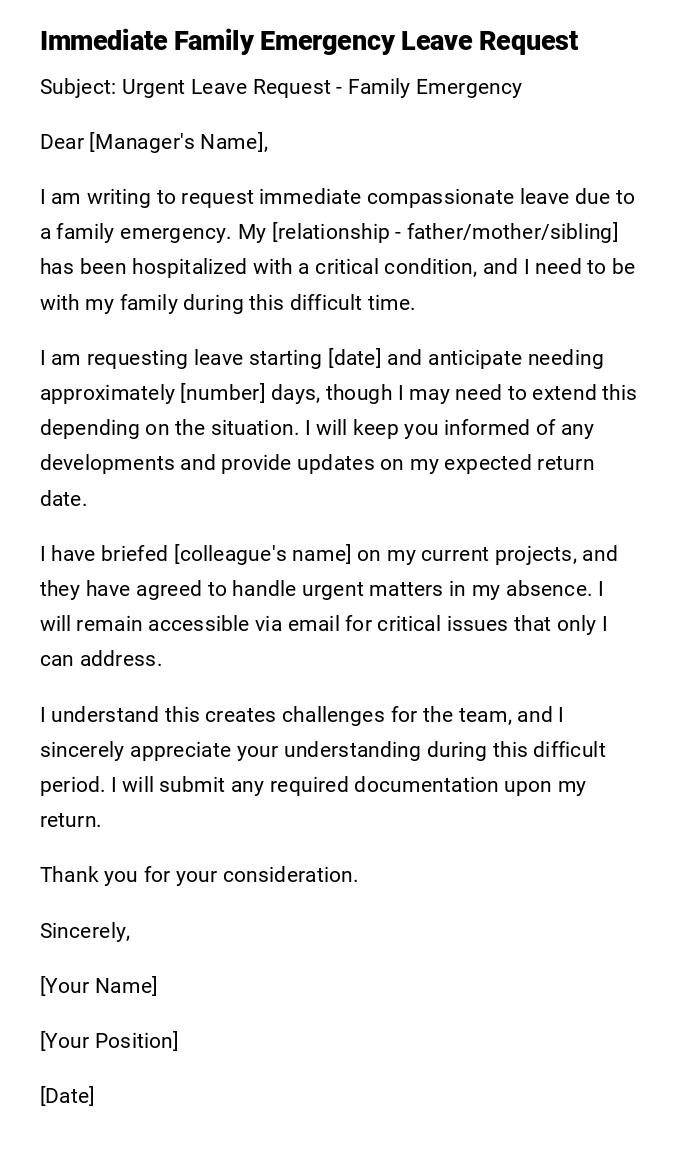
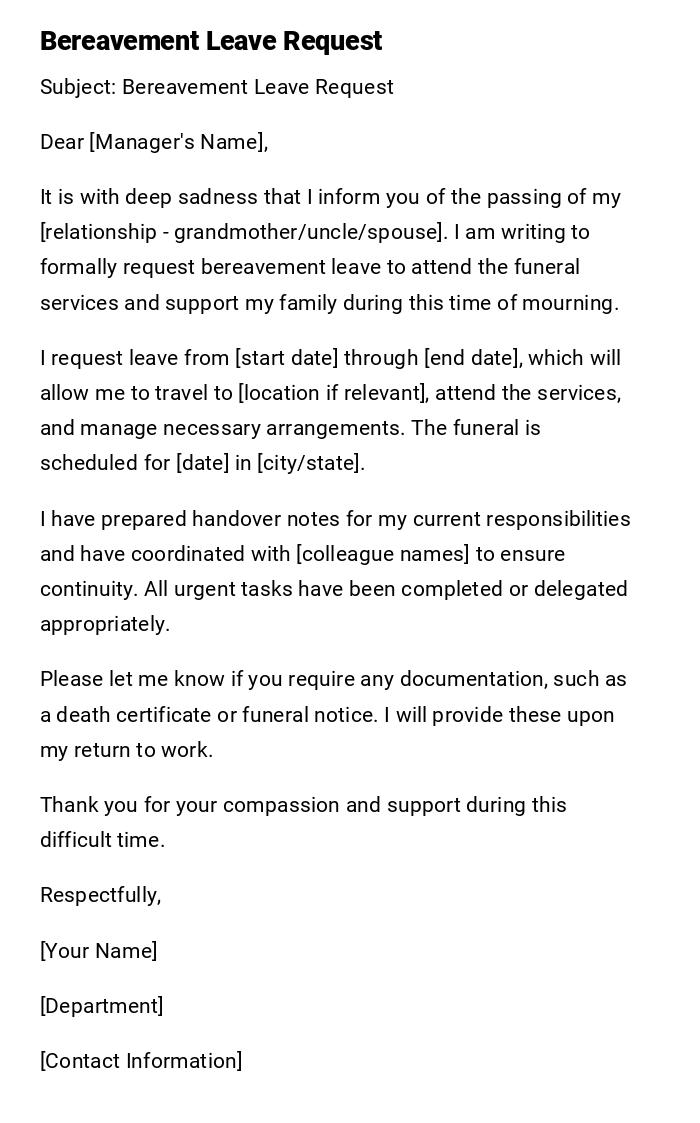
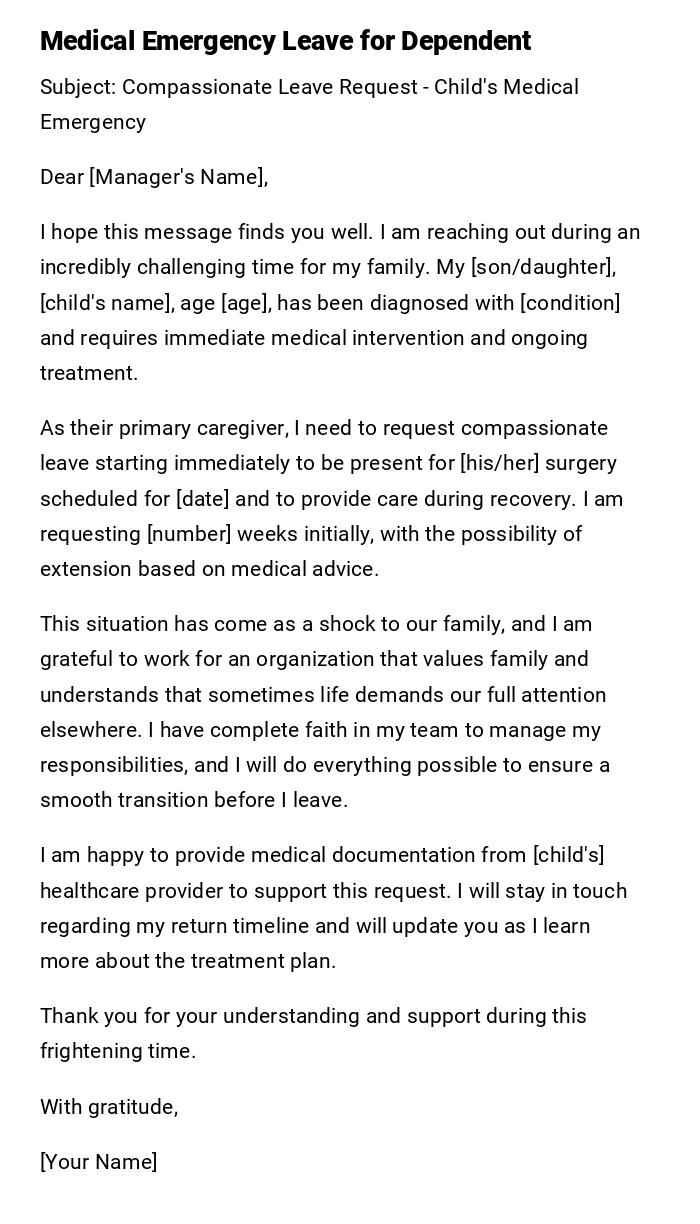
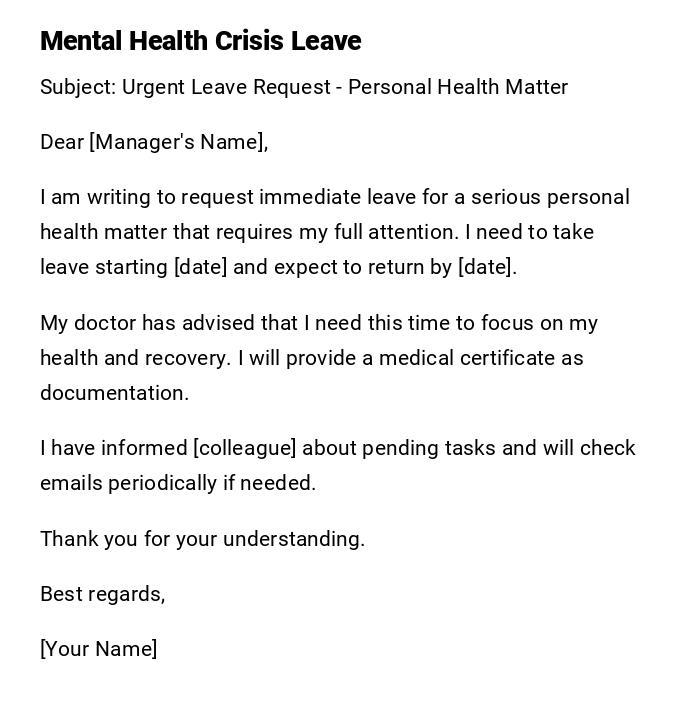
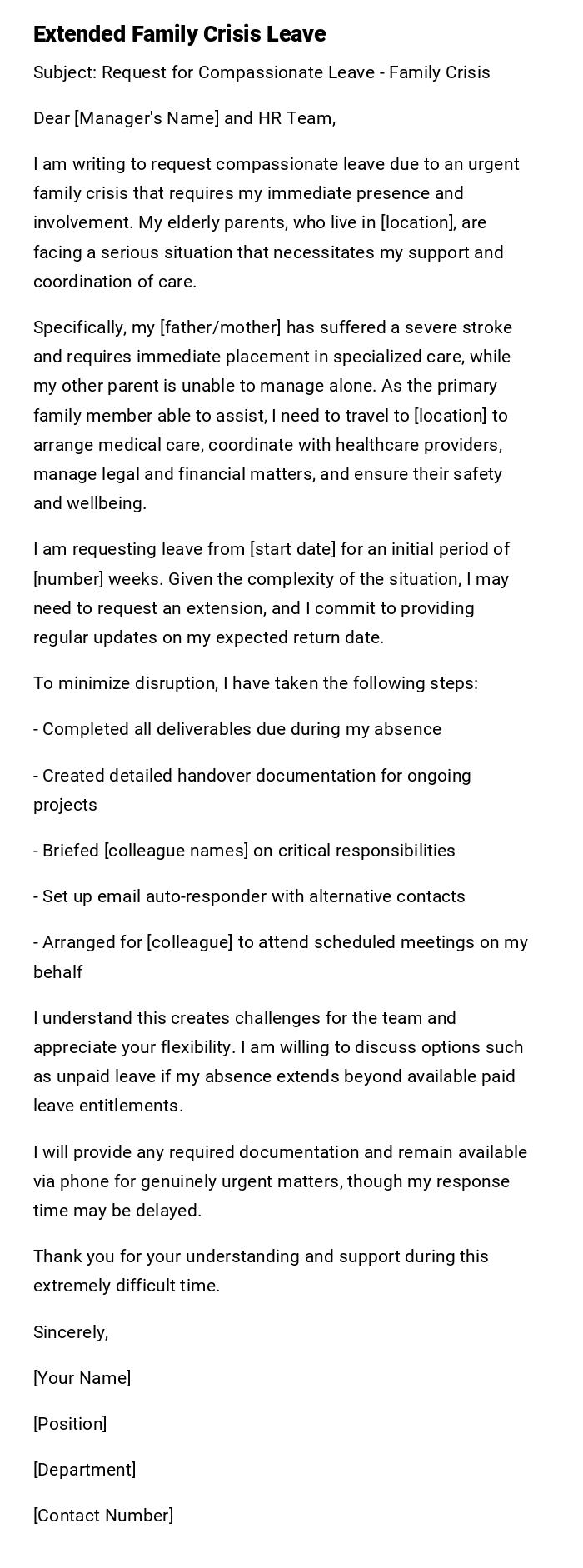
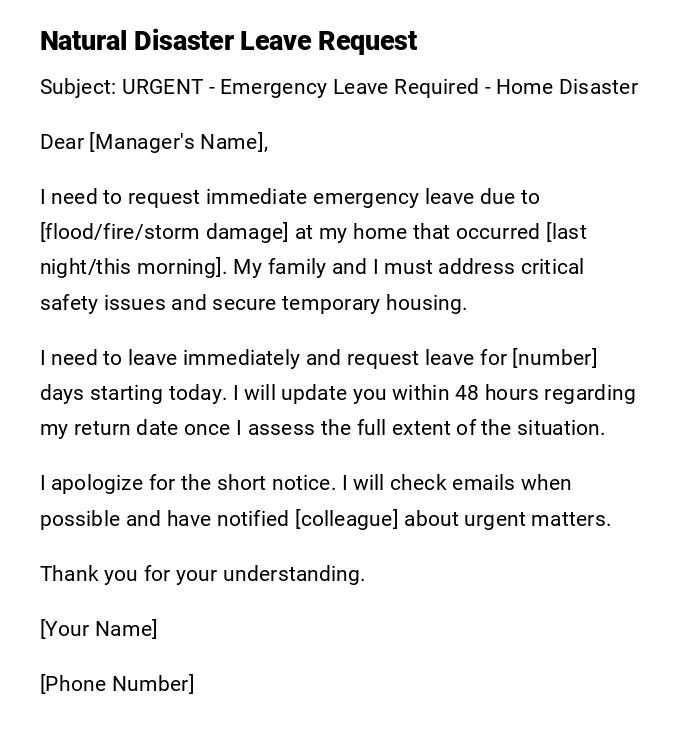
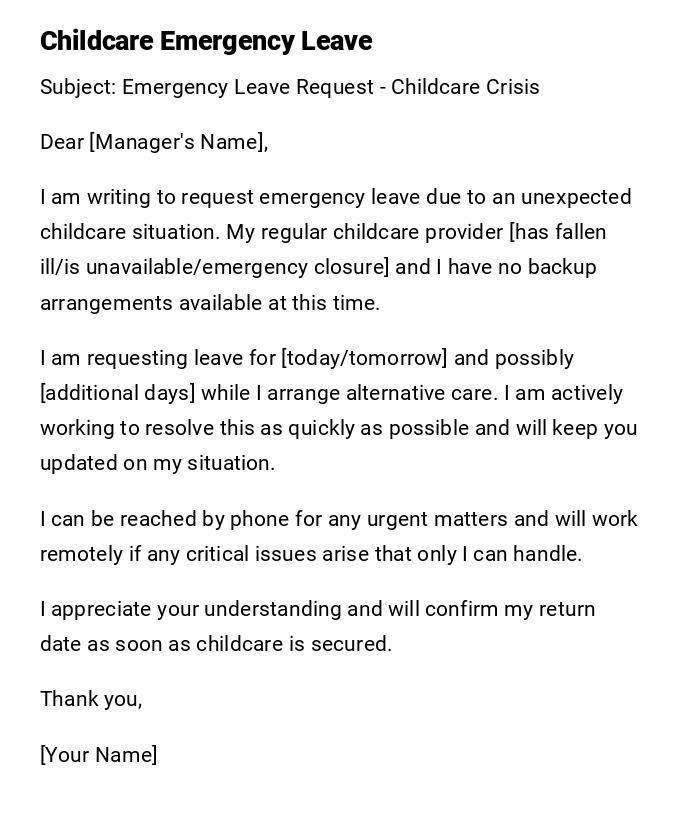
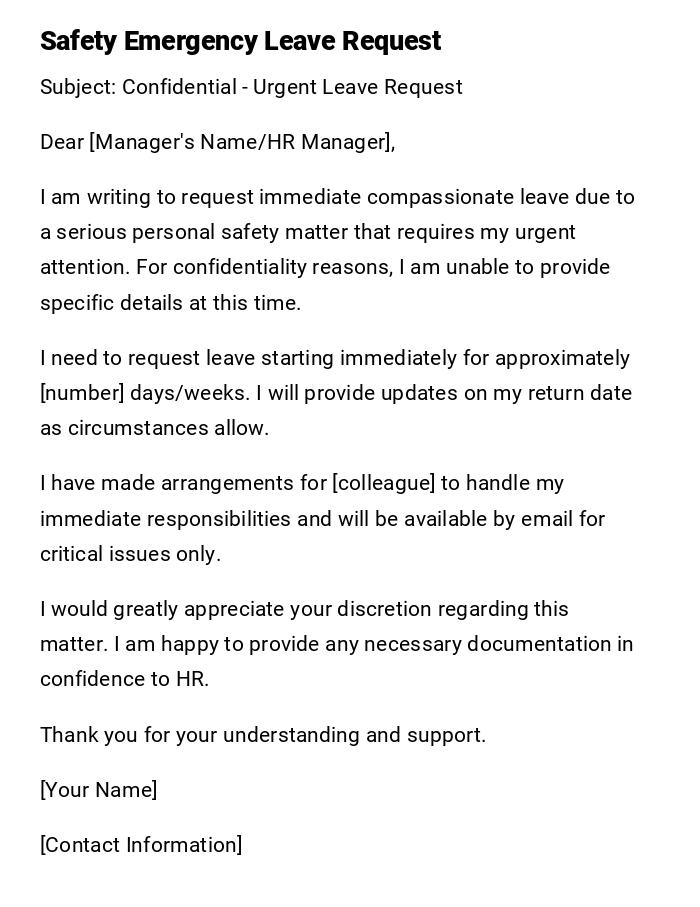

 Download Word Doc
Download Word Doc
 Download PDF
Download PDF